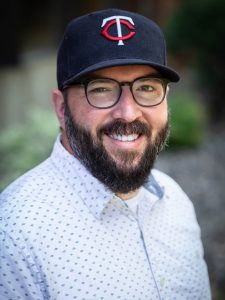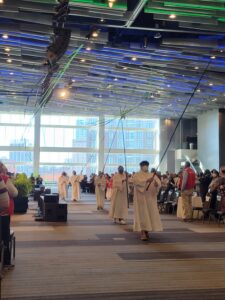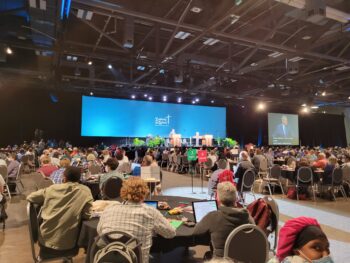 By Nicholas Tangen
By Nicholas Tangen
Last week I joined a number of other Minneapolis Area Synod representatives at the ELCA Churchwide Assembly in Columbus, Ohio under the theme “Embody the Word.” Churchwide Assemblies are the highest legislative body of our church and, every three years, voting members from each synod gather to deliberate and pass memorials, amend the constitution, and highlight the ways that God has been at work in our ministry.
This year, our Assembly passed a number of memorials calling on the Churchwide organization to examine and address inequity in the structures and policies of our church. These included memorials revising the process for removing rostered ministers on-leave-from-call, stronger encouragement for congregations and synods to avoid using non-disclosure agreements, and a call to audit the ELCA Constitution and Bylaws through a diversity, equity, and inclusion lens.

Worship celebration at the 2022 ELCA Churchwide Assembly in Columbus, Ohio
I must admit, the sheer volume of pre-assembly reading materials, the trickiness (and sometimes absurdity) of Roberts Rules of Order, and the often-niche issues and concerns can make the Assembly a real challenge for those of us with brains that struggle to focus, bodies that struggle to sit, and roles that don’t show up on the roster. But, despite that struggle, there was one experience that continually challenged, moved, and convicted me – our times of daily worship. In particular, the Service of Word and Prayer on Tuesday afternoon struck a chord, … and plenty of nerves.
“We were not going to simply hold space for an apology and then get back to business as usual, thanks be to God.”
That afternoon, Bishop Elizabeth Eaton had extended an apology to Iglesia Luterana Santa Maria Peregrina for the racist actions of one of our church’s bishops when they removed the congregation’s pastor on the Feast of Our Lady of Guadalupe. This painful event, compounded by a series of troubling behaviors from Bishop Meghan Rohrer and the Sierra Pacific Synod Council, and the agonizingly slow response from Bishop Eaton, has served as a catalyzing and apocalyptic (in the true sense of the word) moment in our church.
The apology itself, in my opinion, mirrored too closely the procedural tone of the plenary sessions, but the response from Iglesia Luterana Santa Maria Perigrina’s leaders was a lesson in graciousness and accountability. They named clearly and emotionally how they were hurt, and why Bishop Eaton and our church have a responsibility to confess, repent, and make reparation. They extended forgiveness to those involved while still seeking appropriate accountability. It was a painful, but holy moment. Now the work to make reparation begins.
FOLLOWING THE APOLOGY, the Assembly gathered for a service of prayer and lament, which thankfully encouraged us all to sit with the discomfort and the challenge of the apology and the actions of our church, not only in regard to the Sierra Pacific Synod, but in every synod and every congregation. We were not going to simply hold space for an apology and then get back to business as usual, thanks be to God.
The service included reflections on Jeremiah 31:15 from BIPOC and LGBTQIA leaders in our church, with each speaking to their experience of the ELCA.
A voice is heard in Ramah, lamentation and bitter weeping. Rachel is weeping for her children; she refuses to be comforted for her children, because they are no more.
The Rev. Imani Olear, the Director for Evangelical Mission in Upstate New York, reflected on Rachel’s prophetic grief and said, “The prophetic grief of real lament should be embraced as a real part of our spiritual practice here in this church – to look honestly at suffering rather than with numbness, fear, self-deception, denial of reality, all in the hope to maintain the status quo of white supremacy behaviors.”

A plenary session at the 2022 ELCA Churchwide Assembly August 8-12
The Rev. Manuel Retamoza, pastor at St. Andrew’s Lutheran Church in San Diego and member of the Cherokee Nation, reflecting on a quote from Vine Deloria Jr., asked whether the ELCA desired to be good or to be real: “We as individuals and a church can look back and say ‘We could have done better for our native people of the Americas,’ but that is not enough. Could we embark on new paths of action? How long O, Lord until we do more than good? How long until we make things right? Because we believe the lie – if we are real, then the truth will come out – that the church has not always been and isn’t now as good as we believe the church to be, or ourselves to be. Jesus has called us to do more.”
Retamoza’s words have been with me all week. In some ways this challenge captures so clearly my own discomfort with the work of the Assembly; did we want to be good or real? This is, I think, a real tension for us as a church – at all three expressions. It’s a tension ongoing for myself. I know my own desire to appear good, to fall into the trap of perfectionism and performance, and I know how limiting that is when trying to root out injustice and inequity in our life together.
“What will need to die and rise again in order for each of us as the ELCA to embrace the reconciliation Jesus has set us free to participate in?”
This invitation into the vulnerability, the messiness, and the real-ness of confession and reconciliation stood in such stark contrast to the Assembly. The carefully curated plenaries with the steady march towards resolution felt oddly incongruous with the challenge to deeply listen to the cries of prophetic grief. While I am grateful for the provisions and memorials that the Assembly approved, it was the lament and experience of prophetic grief in worship and from the leaders of Iglesia Luterana Santa Maria Perigrina that my heart continues to return to. I feel both profoundly determined and deeply anxious about the church that I love.
Since I left Ohio, I’ve been asking myself what needs to change. What will need to die and rise again in order for each of us as the ELCA to embrace the reconciliation Jesus has set us free to participate in? To be honest, I don’t know. And I don’t think I am supposed to have anything like answers right now.
I think instead I am being called to listen and to be transformed by the prophetic grief in the story of my neighbor. To respond to the grief with confession and repentance. To set down the need to be “good” and learn how to be real. In that real-ness and the churning of the Spirit, I have faith that God will show us the way.

